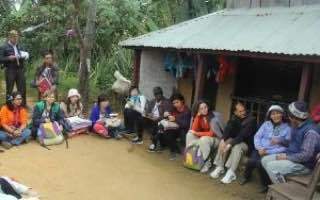The IFAD, the Ministry of Forest and Soil Conservation of Nepal, the Poverty Alleviation Fund (PAF), the Nepal Agriculture Co-Operative Central Federation Ltd. (NACCFL) and PROCASUR launched the Learning Route: “Women’s Empowerment, New Businesses and Sustainable Natural Resource Management in Nepal” from the 06th to the 13th December 2014.
RDF’s social program coordinator, Kuluipa Akmatova, took part in this Learning Route, which took place in districts near Kathmandu, Chitwan and Lumbini, Nepal. Representatives from Latin America, Africa and Asia were also present at this event.
The intense programmes of Learning Route included seminars and visits to farmers, cooperatives and natural resource management communities. The Learning Route’s main objective was to introduce best practices and successful strategies for rural livelihoods improvement through gender sensitive natural resource and cooperative management.
The Learning Route coveredthe following 4 thematic areas:
1. Women’s empowerment and gender mainstreaming: Women’s involvement in social, economic and financial activities assit them to play leading roles at the community level and later to that of cooperatives and other organizations. This exposure to a new horizon builds skills and self-conidence in women in the public sphere, and improves the gender relations in the households.
2. Diversification of rural livelihoods: Through the promotion of a saving culture and loans at a fair rate, the cooperatives are encouraging the development of new small rural businesses, both at individual and group levels. These micro-markets offer new, sustainable and more profitable opportunities for the younger generations to stay in rural communities.
3. Innovative solutions in community forestry management: The extended Natural Resource Management promoted by LFLP and PAF are fundamental in recovering the biodiversity of the territories, and therefore, is responding better to the climate change-related challenges.
4. Development of member-based microfinance organizations: The consolidation of a nation-wide network of originally small farmer cooperatives has been the result of the progressive empowerment at the village and the district levels and of the smart linkages with financial and non-financial institutions.
